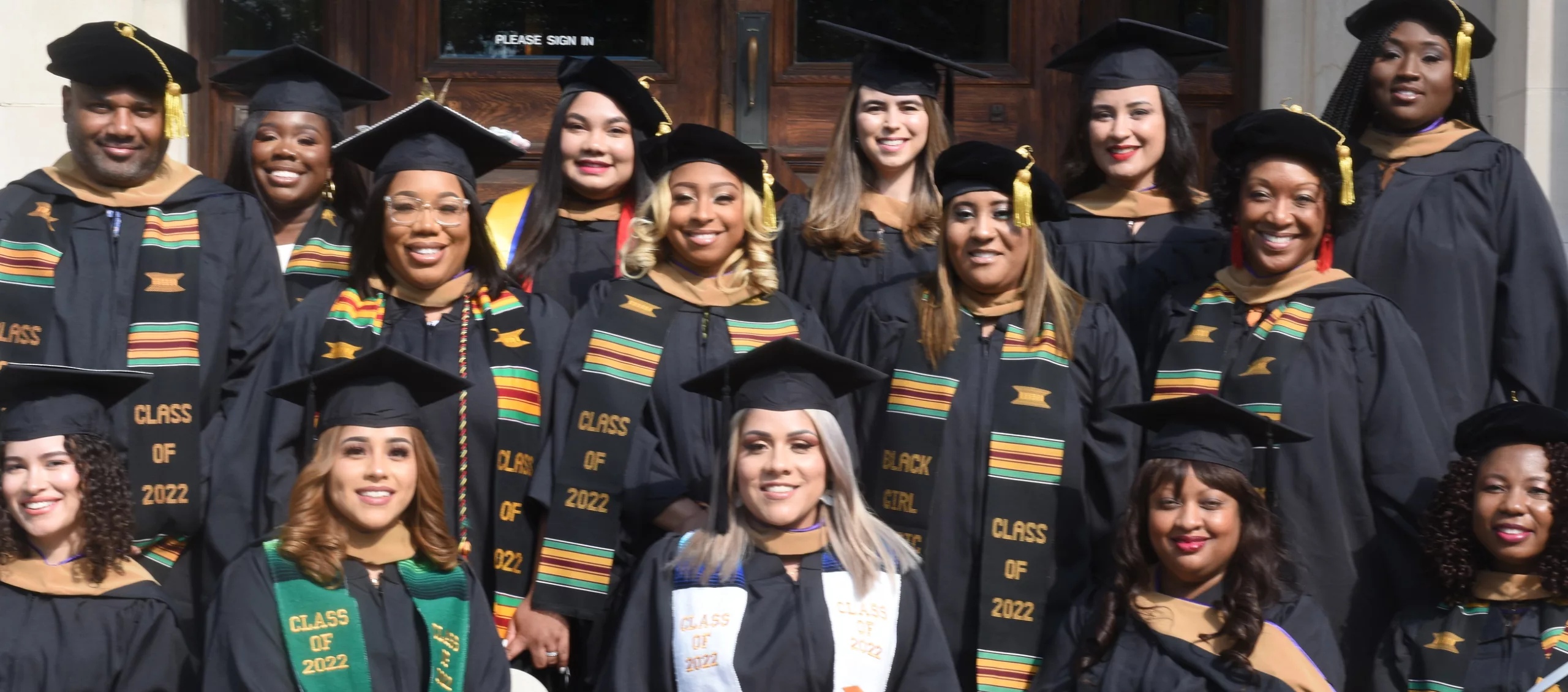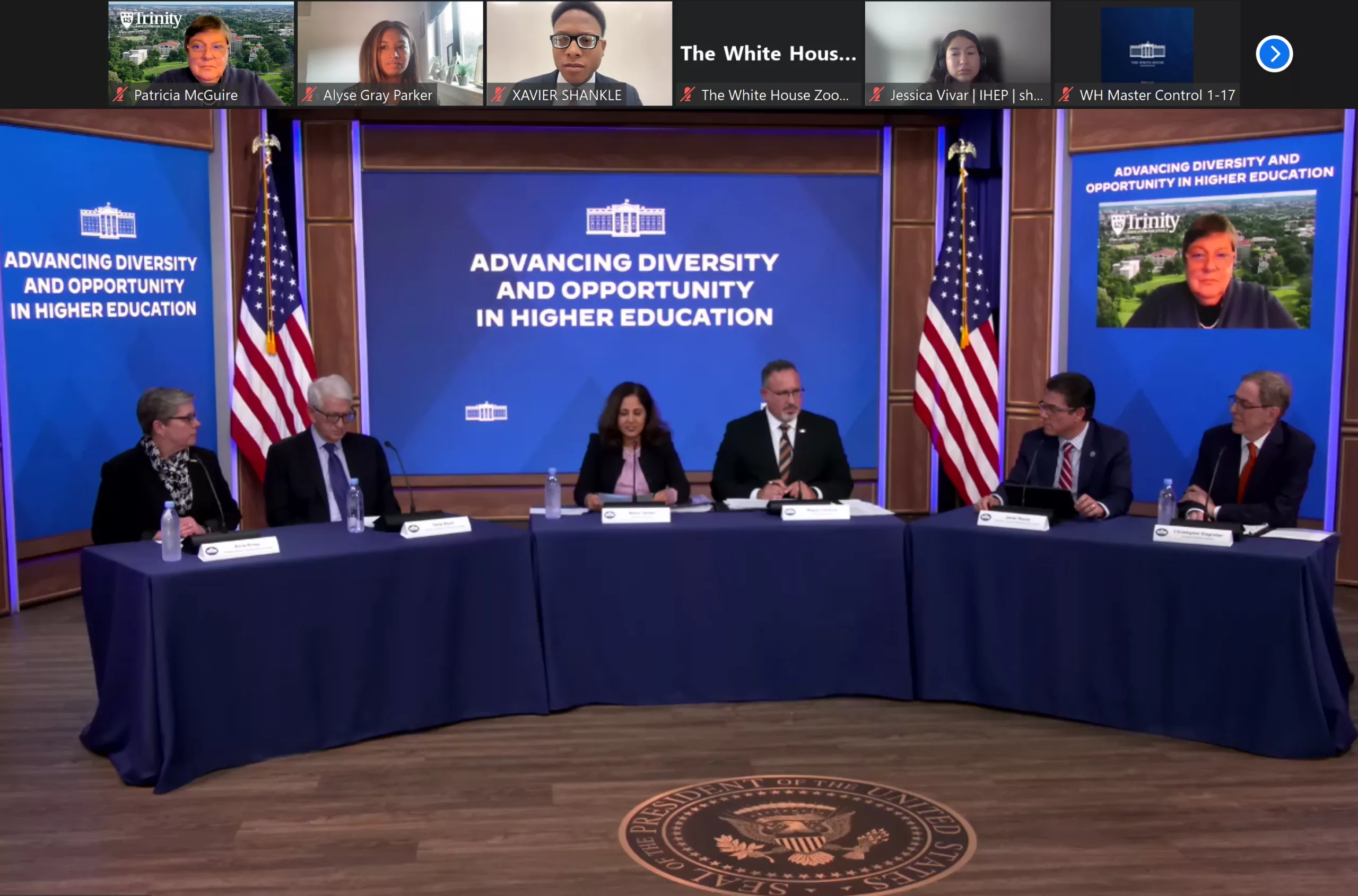
Trinity at the White House Convening on Diversity in Higher Education

On September 28, 2023, I was honored to be one of six university presidents invited to participate along with senior administration officials in a White House convening for the release of a new Department of Education report, “Strategies for Increasing Diversity and Opportunity in Higher Education.” The report outlines evidence-based strategies and answers President Biden’s charge to the Department to elevate promising practices to build inclusive, diverse student bodies in the wake of the Supreme Court’s decision on affirmative action. Participants included:
- Neera Tanden, White House Domestic Policy Advisor
- Secretary Miguel Cardona, Department of Education
- Gene Block, Chancellor, University of California, Los Angeles
- Chris Eisgruber, President, Princeton University
- Anne Kress, President, Northern Virginia Community College
- Pat McGuire, President, Trinity Washington University
- Javier Reyes, President, University of Massachusetts, Amherst
- David Wilson, President, Morgan State University
Trinity’s great work in racial equity and educational opportunity is receiving greater recognition than ever before.

This is the full text of my statement on Trinity’s work in diversity and opportunity in higher education:
Trinity Washington University has a 125-year history of ensuring access for students who face barriers to a college education. When the Sisters of Notre Dame founded Trinity College in 1897, the students were white Catholic women who were barred from admission to the men’s colleges of that era. Today, Trinity continues the founding mission of access by welcoming a large majority of low-income Black and Hispanic students.
In 2023, Trinity is both a Predominantly Black Institution (56% Black students) and a Hispanic Serving Institution (30% Hispanic students), one of only 3 private colleges to have both designations. Trinity sustains its historic daytime women’s college (Trinity is 95% female) while supporting coeducational graduate, professional and dual enrollment programs serving students of all ages and backgrounds. More than 60% of Trinity students are eligible for Pell grants, with median family incomes of just about $30,000. More than 10% of Trinity undergraduates are undocumented immigrants. 100% of Trinity undergraduates receive Trinity grants in addition to federal and D.C, aid. A majority of Trinity students are D.C. residents; nearly 70% of full-time D.C. undergraduates at Trinity pay zero tuition as a result of the generous aid packages. Trinity is the only university in Washington offering a degree program “east of the river” at a location known as THEARC in Ward 8 among some of the most impoverished neighborhoods in D.C.
Trinity’s decades-long transformation, rooted in the founders’ commitment to social justice, has had profound ramifications for everything from academic programs and pedagogy, to campus culture and philanthropic support. Trinity took these actions to ensure success for its increasingly diverse student population:
- Partnerships: Strong partnerships with the D.C. Public Schools (DCPS) and a range of college access organizations like the D.C. College Access Program opened pathways for students to attend Trinity. Examples of partnership initiatives include:
- With DCPS and the Office of the State Superintendent (OSSE), Trinity developed the Early College Academy with Coolidge Senior High, along with dual enrollment programs especially in high demand fields including cybersecurity and prenursing, courses offered through individual schools and at the Advanced Technical Center in D.C. A grant through the Predominantly Black Institutions (PBI) program of the U.S. Department of Education supported some of this development.
- A strong partnership with TheDream.US supports more than 100 undoc students at Trinity.
- A partnership with the D.C. Department of Employment Services supports adult students earning credentials as Community Health Workers.
- A partnership funded by JP Morgan including Trinity, American University and Martha’s Table provides credentials and associate degrees in Early Childhood Education for several hundred child care workers in D.C.
- Trinity also has partnerships with corporate entities working with public school students, such as the American Biotech Association Summer Bootcamp for students from McKinley Tech High School, as well as the Capital CoLab of the Greater Washington Partnership for technology-focused courses.
- While Trinity has a number of articulation agreements with community colleges in the Washington region, more recently Trinity entered an agreement with Borough of Manhattan Community College to offer opportunities in the nation’s capital for BMCC students to complete their baccalaureate degrees.
- Trinity’s partnership with Generation Hope, an organization supporting students who are also parent, provides critical scholarship and educational support for our young mothers and has helped Trinity to create a Family Resource Center on campus.
- Resources: This work requires great resources, and our benefactors love to support our students. Private benefactors have donated millions to support scholarships, study abroad experiences, paid internships and summer research opportunities to make it possible for Trinity’s low-income students to participate in learning activities that would otherwise be inaccessible to them because of cost. We are fortunate that a number of leading foundations have also supported Trinity’s work in equity including Clark, Cafritz, Carnegie, Luce, Mellon, Sloan, Teagle and others.
- PBI Program: Two major grants through the PBI program of USDE made it possible for Trinity to transform laboratories and technologies for STEM and Nursing programs in ways that led to larger enrollments, persistence and completion of Black students, and significant outcomes including a 100% NCLEX (nursing licensure exam) first time pass rate in Spring 2023. Success in Nursing, made possible by the PBI program’s modernization of the instructional environment and faculty development, led a private benefactor to increase his support substantially, now providing scholarships for 160 Nursing students at Trinity, a $2 million annual gift.
- Advising for Success: Creation of the Center for Student Success (also supported in part by a PBI grant) promotes more wholistic academic advising and support to connect students to the services and assistance in ways that are tailored for each student, thus improving persistence, retention and completion.
- Inclusive Excellence: With a more diverse student population, Trinity’s faculty felt an urgent need to transform curricula and pedagogy for student success. With a major grant from the Howard Hughes Medical Institute, Trinity focused on improving faculty capacity to practice inclusive excellence in curriculum design and pedagogy in order to promote student persistence, academic achievement and completion.
- Research Internships: With a major grant from the Sloan Foundation Equitable Pathways program, opportunities opened for student summer research internships at Johns Hopkins University for STEM majors; grants through the NASA DC Space Grant Program also support student research internships. Other Trinity students received internship opportunities with the Mayo Clinic, New York University, Howard University and other labs. Global Studies majors had fellowships and internships with the Middlebury Institute on Nuclear Nonproliferation; the Center for Global Solutions; and the Center for Strategic and International Studies.
- Faculty Diversity: Trinity makes hiring for mission a central feature of recruitment of faculty and staff; 63% of Trinity’s full-time faculty are persons of color in 2023.
- Humanities for Justice: With a grant from the Teagle Foundation, Trinity faculty are engaged in a project to develop a university-wide emphasis to integrate Humanities considerations in all major pathways, including professional majors, “to teach student the historical, interpretive, and analytical thinking about the function of justice in their chosen career fields through exploration of a focused set of literary, philosophical, and historical texts.” As the faculty proposal stated, “Social justice is not an abstraction on our campus. Our students organize protests, and educate the local community, and participate in symposiums on campus about environmental justice, racial justice, immigration policies, gun violence, and women’s rights.”
- Commitment to Racial, Gender and Social Equity: The policy statement Trinity DARE: Driving Actions for Racial Equity underscores Trinity’s commitment to practice racial, gender and social equity throughout the university’s curricula and programs, to work with funding partners to enlarge scholarship support for students of color, and to work with employers to widen career pipelines to ensure that Trinity’s Black and Latina students have “seats at the table” with major employers in the Washington region.
Trinity’s work in diversity, equity, inclusion and ultimate student success is far from complete. But Trinity’s model demonstrates the possibilities for dramatically improved enrollment and successful outcomes for Black and Hispanic students when an institution chooses to make such students a priority. If a relatively small, under-capitalized university like Trinity can do this, surely larger, wealthier institutions can make more substantial commitments to moving marginalized students into the mainstream of higher education and ultimate success.
See Washington Post article Biden administration advises colleges on how to preserve diversity
The full video of the convening is available below; my part about Trinity begins at about 51:55 but the entire program is worth watching!
Thank you, President Maguire for sharing Trinity’s contribution to this important directive.
President Patricia McGuire’s commitment to DEI has made me so proud to be a Trinity alumni.